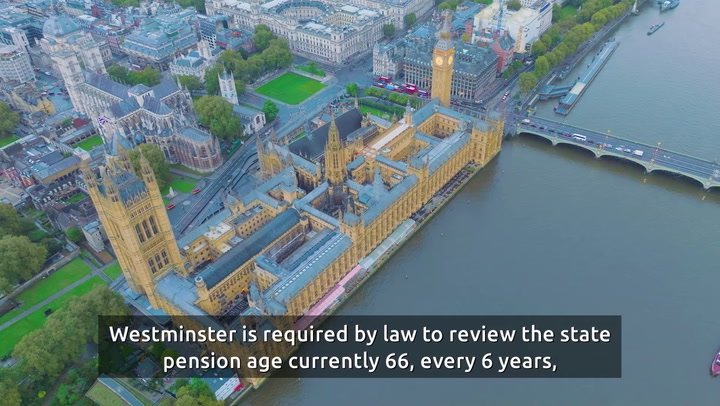People will need to work longer as the State Pension age will increase from 66 to 67 between 2026 and 2028.
11:23, 23 Oct 2025Updated 11:57, 23 Oct 2025
 State pension age to be reviewed by UK Government amid fears that 45% of workers are not saving
State pension age to be reviewed by UK Government amid fears that 45% of workers are not saving
The State Pension age is set to start rising from 66 to 67 next April, with the increase due to be completed for all men and women across the UK by 2028. The planned change to the official age of retirement has been in legislation since 2014 with a further rise from 67 to 68 set to be implemented between 2044 and 2046.
The UK Government has also changed the way in which the increase in State Pension age is phased so rather than reaching State Pension age on a specific date, people born between March 6, 1961 and April 5, 1977 will be able to claim the State Pension once they reach 67.
The Department for Work and Pensions (DWP) has set out measures aimed at helping older people, especially those in their 60s, find and stay in work.
READ MORE: New State Pension age changes set to delay retirement payments for millions of peopleREAD MORE: New State Pension rates from April could push more older people over tax threshold
In a written response to Lib Dem MP Max Wilkinson, who asked “what discussions his Department has had with industry stakeholders on improving job prospects for people in their 60s”, Employment Minister Dame Diana Johnson said the DWP is “committed to supporting older people through a wide-ranging strategy that promotes inclusion, flexibility, and progression”.
These measures include:
- Promoting age-inclusive practices
- Supporting workplace health, policy and service reform
- Removing age related barriers to employment
Ms Johnson continued: “The Department has also signed up to and actively promotes the Age-Friendly Employer Pledge, encouraging employers to adopt flexible working, age-positive hiring, and career development.
“Our Jobs and Careers service will enable everyone to access support to find good, meaningful work, and help them progress in work or increase their earnings. The Jobs and Careers Service will incorporate principles of accessibility and inclusivity, acknowledging diverse support needs, including those of older individuals.
“We are taking a test and learn approach to developing the new service, working in an agile and flexible way. This will allow us to hear from a range of organisations and perspectives, as we develop the new service.”
She added that the DWP’s ‘Strategic Relationship Team’ is “actively engaging trade bodies and strategic employers across priority sectors, such as clean energy, digital, hospitality and construction, through innovation workshops, tailored recruitment pilots, and sector-led initiatives to promote DWP as the recruitment partner of choice and expand inclusive employment opportunities”.
The UK Government recently announced a new Pension Commission to investigate how to boost pension saving with its findings due to be published in 2027.
Areas for consideration will include auto-enrolment saving rates, boosting saving among groups such as the self-employed and a review of the State Pension age.
After the review has reported, the UK Government may then choose to bring forward changes to the State Pension age. However, any proposals would have to go through Parliament before becoming law.
Check your State Pension age online
Your State Pension age is the earliest age you can start receiving your State Pension. It may be different to the age you can get a workplace or personal pension.
Anyone of any age can use the online tool at GOV.UK to check their State Pension age, which can be an essential part of planning your retirement.
You can use the State Pension age tool to check:
- When you will reach State Pension age
- Your Pension Credit qualifying age
- When you will be eligible for free bus travel – this is at age 60 in Scotland
Check your State Pension age online here.
Boosting State Pension payments
HM Revenue and Customs (HMRC) recently announced more than 10,000 payments worth £12.5 million have been made by people through the new digital service to boost State Pensions since it launched last year.
However, anyone keen to maximise their retirement income through the contributory benefit has just a few weeks left to fill any gaps in their National Insurance (NI) records going back as far as 2006.
Usually people can only pay voluntary contributions for the past six tax years, and after the April 5 deadline this year the normal six-tax year time limit will apply.
In 2023, the previous government extended the deadline to pay voluntary NI contributions to April 5, 2025 for those affected by new State Pension transitional arrangements, covering the tax years running from April 6, 2006 to April 5, 2018.
The extended deadline has allowed people more time to consider what is right for them and make their contributions.
Men born after April 6, 1951 and women born after April 6, 1953 are eligible to make voluntary NI contributions to boost their New State Pension.
Some people may be entitled to NI credits rather than needing to pay contributions, so they will need to check and consider what is right for them.
People can find out more about making voluntary contributions on GOV.UK here. People of working age can also check their State Pension forecast on GOV.UK here.
 Get the latest Record Money news
Get the latest Record Money news
Join the conversation on our Money Saving Scotland Facebook group for money-saving tips, the latest State Pension and benefits news, energy bill advice and cost of living updates.
Sign up to our Record Money newsletter and get the top stories sent to your inbox daily from Monday to Friday with a special cost of living edition every Thursday – sign up here.
You can also follow us on X (formerly Twitter) @Recordmoney_ for regular updates throughout the day or get money news alerts on your phone by joining our Daily Record Money WhatsApp community.
